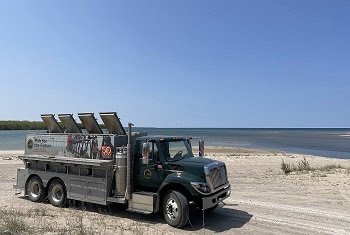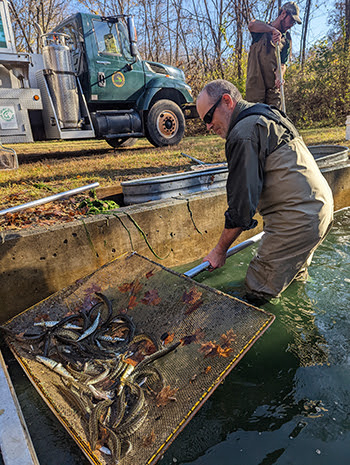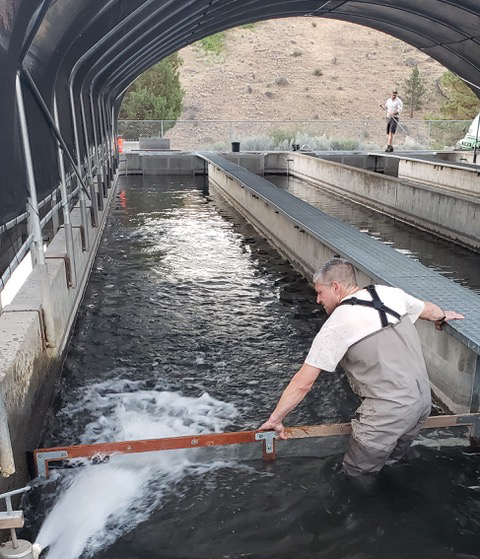State rears and stocks muskellunge to create fishing opportunities throughout Michigan
 The Department of Natural Resources recently stocked 27,449 muskellunge fingerlings into 17 water bodies located throughout the state, in an effort to further enhance Michigan’s world-class fisheries.
The Department of Natural Resources recently stocked 27,449 muskellunge fingerlings into 17 water bodies located throughout the state, in an effort to further enhance Michigan’s world-class fisheries.
Michigan is home to two strains of naturally producing muskellunge: Great Lakes and northern. The DNR has reared muskellunge in its hatcheries since the 1950s. While the hatchery program initially focused on the northern muskellunge strain, it has shifted focus in recent years to the Great Lakes strain, as it is native to Michigan and widely distributed in water bodies throughout the Lower Peninsula and eastern region of the Upper Peninsula.
Since 2011 the DNR has collected eggs and milt (sperm) from adult muskellunge in the Lake St. Clair/Detroit River system. The offspring then are reared at Wolf Lake State Fish Hatchery in Mattawan. This hatchery is the only facility in the state currently capable of rearing this species. After hatching, the muskellunge are started in hatchery tanks and then transferred to outside ponds after a few months for grow-out.
Historically, muskellunge were reared by stocking fry in ponds and allowing them to grow by eating natural food, similar to how the DNR currently rears walleye. Because of the highly cannibalistic nature of muskellunge, the success of these rearing efforts was highly variable and often produced low numbers. Current rearing efforts at Wolf Lake State Fish Hatchery produce a much higher survival rate and more stable, predictable production.
“We’re making great headway in our efforts to increase muskellunge fishing opportunities for anglers,” said DNR fisheries biologist Matt Hughes, who oversees the rearing program at Wolf Lake State Fish Hatchery. “With time and experience, we’ve stabilized and increased production so more and more water bodies can be stocked.”
Below is a chart of the water bodies stocked this fall with 9-inch-long muskellunge.
| Water Body | County | Number Stocked |
| Austin Lake | Kalamazoo | 1,450 |
| Dana Lake | Delta | 147 |
| Grand River (120th Street) | Ottawa | 687 |
| Grand River (Indian Channel) | Ottawa | 813 |
| Hamlin Lake | Mason | 7,671 |
| Kingston Lake | Alger | 150 |
| Lake Besser | Alpena | 588 |
| Lake Diane | Hillsdale | 425 |
| McKeever Lake | Schoolcraft | 210 |
| Muskegon Lake | Muskegon | 6,225 |
| Otsego Lake | Otsego | 2,958 |
| Round Lake | Van Buren | 280 |
| Sanford Lake | Midland | 1,875 |
| Secord Lake | Gladwin | 1,223 |
| Smallwood Lake | Gladwin | 348 |
| Teal Lake | Marquette | 699 |
| Thornapple Lake | Barry | 1,700 |
| Total: 27,449 |
Due to extremely high survival during early rearing stages, an additional 79,948 fish averaging 1.3 inches in length were stocked in early July. Ottawa County’s Lake Macatawa received 49,972 fish, and Mona Lake in Muskegon County received 29,976 fish. These fish were surplus due to limited rearing capacity.
An additional 1,500 northern strain muskellunge were stocked in Bankson Lake (Van Buren County- 434 fish), Eagle Lake (Kalamazoo County-142 fish), Lake Hudson (Lenawee County- 502 fish) and Long Lake (St. Joseph County- 422 fish). These fish came from the Wisconsin Department of Natural Resources as part of a cooperative agreement to trade Great Lakes strain muskellunge for northern strain muskellunge.
For more information on the DNR’s fish-stocking efforts, check out the Fish Stocking Database at www.michigandnr.com/fishstock/.





